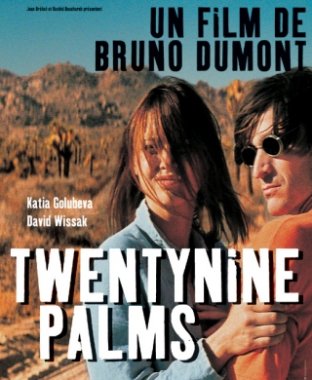
29 PALMS
France, 2003, 119 minutes, Colour.
David Wissak, Katia Golubeva.
Directed by Bruno Dumont.
29 Palms is written and directed by Bruno Dumont, director of The Life of Jesus and of the Cannes Golden Palm-winning film Humanity. Dumont said that he went into the American desert, was fascinated by its landscapes and its meanings (as so many other Europeans have done, for instance, Antonioni with Zabriskie Point). He returned to France and wrote his screenplay in two weeks. He takes two characters, an American photographer and his Russian girlfriend. They journey into the desert via the ordinary towns, motels, supermarkets and go further into the deserts with the landscapes, the Joshua trees, the mountains. He wanted his film to be in some ways mystical and in some ways hallucinogenic.
One of the difficulties for many audiences is that he uses very long, very long takes. Many of the takes are about very mundane realities. Several minutes in a supermarket, people sitting on rocks in the desert, scenes of lovemaking.
His characters are not always clearly delineated. The American is a photographer looking for locations. We know very little about the Russian girlfriend. He speaks some French, she speaks very little English. They communicate, they make love, they clash. She is particularly moody. In the desert they encounter a group of men who violently assault them. The ending is an extraordinary explosion of blood and violence - and very difficult to understand the motivation. Had the man, who had been raped by these men, taken vengeance on them or even on himself rather than on his girlfriend, the ending would have been more comprehensible. Dumont said he started with a road film and ended with American horror.
1. The impact of the film? For those interested in Dumont, his style, his issues? For those who are not?
2. His journey into the desert, the effect on him? California, Los Angeles, the outskirts of Los Angeles, the windmills, the remains of the oil industry? The mountains, dry desert? The towns, the supermarkets, the motels? The lonely roads? Realism and fantasy? The musical score?
3. The characters: the photographer, the American background, his relationship to the woman? His care for her, love for her, trying to understand her moods? The young woman, knowing nothing of her background, speaking French, her moods, lovemaking? Her driving the car? The audience having enough time to contemplate them and to try to understand them?
4. The ordinary incidents along the way, the driving of the car, the shots through the windscreen, the Californian roads? The towns, the ordinary people, the shops, motels? The interiors? The scene of having the ice cream?
5. Going into the desert, the landscapes, the rocks, the dryness? Taking off their clothes? The sexual encounters? The film punctuated with sexual encounters, their meaning, love, passion?
6. The men in the desert, driving the car, pushing them (echoes of Duel), stopping the car? The three men and their anonymity - young, skinhead? The violent assault, the rape of the man? The violence on the woman?
7. David and the aftermath in the motel, the effect on him, getting the knife, the brutality of his attack on the girlfriend? Sufficient motivation for audiences to understand why? The journey of self-awareness and relationships ending in such violence and death?